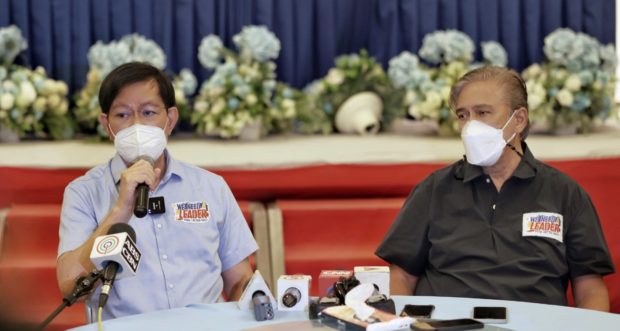‘We need tough leaders,’ Lacson tells Isabela voters

Sen. Panfilo Lacson (left) and Senate President Vicente Sotto III hold a press conference in Cauayan, Isabela on Monday, March 14, 2022. (Photo from Lacson-Sotto Media Bureau)
CAUAYAN, Isabela, Philippines — From the impact of the COVID-19 pandemic to the country’s P12-trillion debt, these are “tough problems” that need “tough leaders,” Sen. Panfilo Lacson, presidential candidate, said Monday as he and his running mate tried to woo voters here.
“The country is facing so many problems, very tough problems. Tough solutions should be laid out,” Lacson said, speaking in a mix of English and Filipino, during a sectoral meeting at the FLDy Coliseum in Cauayan.
“And what do we need to face these tough problems and have tough solutions? We need tough leaders. Someone with knowledge, someone with experience to solve the problems of the country. We can’t settle for stories, for promises.” he said.
Lacson, who is running with vice presidential contender Senate President Vicente Sotto III, stressed the need for the next leaders of the country to have a “concrete and doable” platform of government that would lead to progress.
“It’s easy to make promises. We can say that the day after we win we will raise the minimum wage to P100,000. It’s easy to say. But is it doable? No,” he said.
Article continues after this advertisementBefore this, Lacson enumerated the country’s problems. Among them is the impact of the pandemic, particularly the loss of jobs.
Article continues after this advertisement“When we were hit by the pandemic, more than 400,000 lost their jobs. Think about the problems caused by the pandemic,” he said.
Further, he lamented the P12-trillion national debt. He told Isabela residents that P1.2 trillion would be taken out of the 2022 national budget as payment for this debt, an amount which he said could be used for social services.
“That’s what we have been deprived of. Because we were hit by the pandemic, the government needed to borrow money,” he said.
Budget reforms
He then underscored his and Sotto’s proposed Budget Reform Advocacy for Village Empowerment (BRAVE), which seeks to empower local government units (LGUs).
Lacson said he filed a bill in the Senate pushing for this budget reform, but it had no counterpart measure in the House of Representatives.
If elected, Lacson vowed to push for this.
He added that he and Sotto, in their years of scrutinizing the budget as part of their mandate as senators, discovered that only 20 percent of local development projects receive allocations under the entire national budget.
He said this leads to unutilized funds.
“Our national budget is big, but we don’t use it all up. Why? Because there is a lack of planning, lack of preparation because the local government units are not involved,” Lacson went on.
He said, if their proposed budget reform would be implemented, the budget process would become a “bottom-up” approach. This means all local development plans to be funded under the budget should first be endorsed from the barangay to the municipal level and then from the provincial level to the regional development councils.
Streamlining aid programs
Lacson, meanwhile, pointed out the need to streamline the 16 assistance programs being implemented by the Department of Social Welfare and Development.
“Every program has a program director. And of course, the program director will have their own staff. Overhead. We can collapse it, streamline the programs. We can merge them since they are practically the same,” he said.
“Why do we have so many programs and so many program directors? Let’s focus the budget for social services to those who can really benefit from it and use it to get by and to eventually be lifted out from their situation,” he added.
He also reiterated the need to eradicate corruption in the government.
Prevention and rehabilitation
For his part, Sotto, who previously led the Dangerous Drugs Board, said that prevention and rehabilitation in the country’s fight against illegal drugs should be strengthened.
He cited the Dangerous Drugs Act of 2002, which he principally authored. He said the law lays out how to combat illegal drugs and drug abuse.
“Kailangang lakasan po ‘yung prevention at rehabilitation upang matigil ‘yung mga bumibili. Sapagkat kung walang bibili, walang magbebenta. ‘Yon po ang sinasabi namin doon sa mga batas na ginawa namin, na gusto namin bigyan kami ng pagkakataon na kami mag-implementa,” he added.
“We need to strengthen prevention and rehabilitation to discourage its sale. Because if there’s no one wanting to buy it, nothing will be sold. This is what we mean that in the law we have crafted, We want to be given the chance to implement it,” he said.
Sotto then went on to say how he and Lacson should be given the chance to work in the executive department to properly implement laws, the crafting of which has been their focus for decades as members of the Senate.
“That’s why this is an opportunity. Give us this opportunity and the maybe country’s future will get better,” he said.
The tandem on Monday began barnstorming more “Solid North” provinces, starting with Isabela.
On Tuesday, Lacson and Sotto will woo voters in Cagayan and head to Quirino the next day.